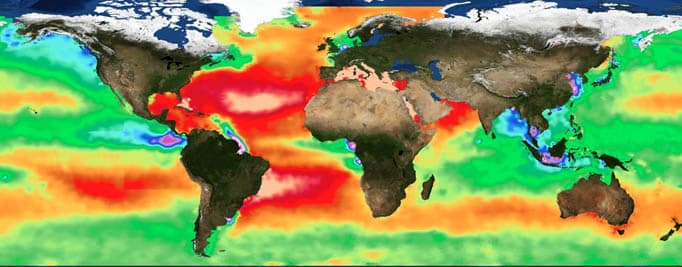Scientists call it the ‘deadly trio.’ If ocean acidification, oxygen loss, and overheating are not ended soon, a massive die-off of ocean life may be unstoppable.
In September 2020, Ian Angus published 3 articles in CLIMATE & CAPITALISM , an eco-socialist / ecological Marxist journal. The articles considered the elements of the deadly trio separately, but stressed the importance of understanding that they are closely related, have the same causes, and frequently reinforce each other.
We will be posting separate links to each of the 3 parts of the articles. Part 1 follows the General Introduction.
General Introduction.
“It is impossible to overstate the importance of the ocean to life on Earth. Covering 71% of the planet’s surface, it contains 97% of the world’s surface water and is central to the great biogeochemical cycles that define the biosphere and make life possible. Marine plants generate half of the world’s breathable oxygen.
The ocean’s metabolism — the constant flows and exchanges of energy and matter that have continued for hundreds of millions of years — is a vital part of the Earth System.
Most accounts of the relationship between the ocean and climate change focus on melting ice and rising sea levels, and indeed those are critical issues. At present rates, by 2100 the combination of global glacial melting and thermal water expansion will flood coastal areas where over 630 million people live today. Well over a billion people live in areas that will be hit by storm surges made bigger and more destructive by warmer seawater. Rapid action to slash greenhouse gas emissions would be fully justified even if rising seas were the only expected result of global warming.
Devastating as sea level rise will be, however, more serious long-term damage to the Earth System is being driven by what marine ecologists describe as the “deadly trio” of ocean warming, acidification and oxygen loss – deadly because when they have occurred together in the past, mass extinctions of animal and plant life have followed. “
CORROSIVE SEAS – Part 1
“Ocean acidification has been called global warming’s equally evil twin. Both are caused by the radical increase in atmospheric CO2, and both are undermining Earth’s life support systems.
The ocean has absorbed about 25% of anthropogenic CO2 emissions and over 90% of the additional solar heat, half of that since 1997. If it hadn’t done so, global warming would already have reached catastrophic levels. As Rachel Carson wrote years ago, “for the globe as a whole, the ocean is the great regulator, the great stabilizer of temperatures…. Without the ocean, our world would be visited by unthinkably harsh extremes of temperature.”
There is always a constant interchange of gas molecules across the air-sea interface, between atmosphere and ocean. CO2 from the air dissolves in the water; CO2 from the water bubbles into the air. Until recently, the two flows were roughly balanced, but now, when atmospheric CO2 has risen 50%, more carbon dioxide is entering the sea than leaving it. Adding CO2 makes seawater more acidic.
Over the past century, the ocean’s pH level has fallen from 8.2 to 8.1. That doesn’t sound like much, but the pH scale is logarithmic, so a drop of 0.1 means that the oceans are now about 30% more acidic than they used to be. That’s a global average — the top 250 meters or so are generally more acidic than the deeps, and acidification is more severe in high latitudes, because CO2 dissolves more easily in colder water.
The present rate of acidification is a hundred times faster than any natural change in at least 55 million years. If it continues, ocean acidity will reach three times the pre-industrial level by the end of this century.” [Extracts from: TRIPLE CRISIS IN THE ANTHROPOCENE OCEAN, PART 1]
READ FULL ARTICLE to better understand the impact of acidification at this link to the whole article :
https://climateandcapitalism.com/2020/09/07/ocean-triple-crisis-part-1/
